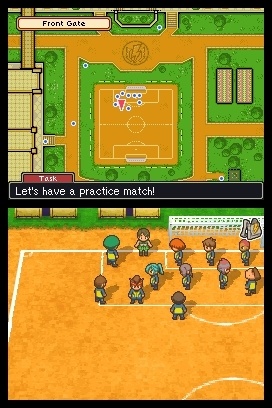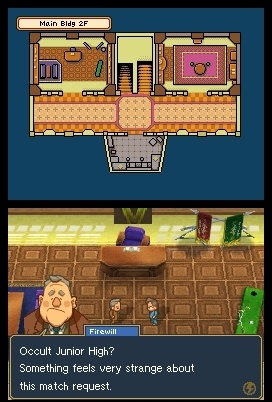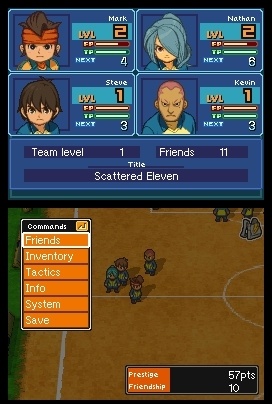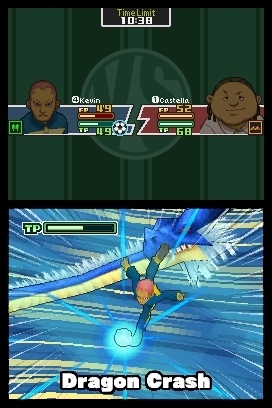UK REVIEW--The concept of a football role-playing game isn't as outlandish as it might seem. Games like FIFA and Football Manager have been doing it to a smaller extent for years. The sport itself isn't dissimilar to a role-playing game either. Players train to raise their stats, managers recruit new members into the "party," and statistics fly fast and furious. The footballing world doesn't feature giant burning dragons or ludicrous conspiracy plots like Inazuma Eleven does--well, not the giant dragons anyway--but the marriage of football and role-playing game is definitely a logical one. The problem with Inazuma Eleven isn't that it combines two unexpected genres, but rather that it does very little to play to the strengths of either genre. It's pleasant, with an endearing plot, but it doesn't capture the thrill of football. There are a host of issues, ranging from fiddly controls to an erratic difficulty curve, compounded by the feel of repetition throughout. It may be charming, but that charm alone isn't enough to win you over.

Originally released in Japan three years ago, Inazuma Eleven is the first game in the series to make its way to English-speaking shores. It centers on the tale of one Mark Evans, a plucky goalkeeper and the leader of the Raimon Junior High football club. Mark really loves football. Sporting a look which falls somewhere between Chris Waddle and the Karate Kid, and with the voice of Luke Triton, Mark serves as a refreshingly upbeat protagonist surrounded by characters who just can't be bothered. It's a typical underdog story--lazy, apathetic footballers whipped into shape by circumstance and Mark's own determination. And the story plays out much as you'd expect from a Japanese role-playing game. Characters with names like Axel Blaze and Kevin Dragonfly find themselves caught up in a tale of conspiracy, intrigue, and suspicious maids. It's suitably silly, and from the outset it's clear this is not a realistic take on football.
The primary hook of Inazuma Eleven is building your team, recruiting new players, training them up, and then facing off against a variety of teams in both a national and a regional tournament. The collection aspect is reminiscent of games like Pokemon, but also of the Panini football sticker books, and Inazuma attempts to play on the compulsion to collect. The desire to fill your team roster (100 slots out of a possible 1,000-plus players in the game) is forced to stand alone here, though. There's little incentive to recruit more than a handful of players in regard to actually improving your team. Good players are either with you from the beginning or recruited as part of the story, so whether you make an effort to recruit a lot more depends on how interested you are in simply collecting things. Later on, recruitable players have more to offer, but again, it's not mandatory that you acquire them.
Actually playing football is initially a complex affair. There are numerous stats to consider for each player, such as guard ability, kick power, speed, and guts. They also have FP (stamina) and TP (mana) gauges. FP depletes the more a player performs basic actions, such as sprinting. TP is consumed by using one of the game's special moves. Each player also has an elemental label; air, wood, fire, or earth. This provides an additional strength or weakness against players of a different element and can also serve to power up special moves if the corresponding player element matches the move's element. Unfortunately, the complexity of the system appears to make little difference when playing through the story. You could spend hours tailoring your lineup to suit each individual adversary, but when you can quite comfortably win 5-0 with almost no thought, there's little point.

On the field, the action is controlled entirely with the stylus. You can direct players where to go, or they'll approximate the best path to take, although if you choose the latter option, they often run wildly away from the ball or stand still for no apparent reason. When engaging a player for a tackle or block, you're presented with one of two options; the first has a low success rate but often results in you retaining control of the ball when it does work, while the second has a higher change of success but generally puts some distance between you and the ball. There are also special moves which can be learned or acquired over the course of the game, with categories for guard, defense, tackling, and shooting. You can also tap a player to sprint, but making a mad dash for the goal never works. One-touch is the order of the day, passing the ball around the pitch until your striker is in a suitable position. In that sense, it's realistic and feels natural, but the lack of any more precise control leads to a strange feeling of disempowerment. Occasionally, especially early on, it feels as if you have little control over the outcome of the match. Particularly annoying is the fouling, as you often seem to get called out for a foul based on the whim of the game rather than any logical statistical calculation.
Matches themselves take on two forms. The first consists of small, four-a-side meetings which serve as the game's random battles. You play against everyone, from the baseball club to the "lazy go home" club, all of which are seemingly as adept at football as the actual football club. At least at first. Initially these random battles serve as a great way to level up your team and earn some prestige points (the game's equivalent of money), but they gradually become tiresome, with matches often taking longer to initialize than actually play. They have different objectives, such as score the first goal or get the ball off the opposing team, but after the first couple of chapters, none of them pose any real challenge, and they offer little in the way of reward. On top of this, recovering your team's FP and TP costs an increasing number of prestige points, so occasionally when you're on the way to an important match and get assailed by numerous chess club members, the cost outweighs the benefits.

The 11-a-side matches are more exciting but are not without their own problems. Initially, the story mode matches are scripted to the point of absurdity, with one particularly abhorrent example near the beginning requiring you to perform the exact moves the game wants you to, at the exact time it demands. It's completely counterintuitive to the idea of playing free-flowing football and serves as a ludicrously off-putting difficulty spike so early on. Thankfully, after that, things ease up a bit, with most story matches requiring a single specific move to be performed initially before things open up and you can just play.
Matches are fun despite the occasional lack of control, and emerging victorious is quite rewarding, although more because of the characters' enthusiasm than because winning presents any real challenge. Slotting four goals into the back of the net without conceding any does get old, so some of the later gimmicks (such as having your stats reduced to 1 due to food poisoning) are welcome in that they force you to mix your tactics up a bit. Any story match can be replayed as a friendly, which means the gimmicks are removed and you just engage in a bit of football, and these are great for boosting your team and enjoying the matches themselves.
Outside of the football, Raimon Junior High and the surrounding town are fun to explore. Finding training spots to boost individual stats, talking to the weird non-player characters hanging around, and discovering chests with new moves are enjoyable diversions. The 2D sprites on 3D backgrounds look great on the small screen, and the jaunty jingles that play as you and your three buddies trail around are upbeat and positive. But it's just not enough. Mark's enthusiasm and the overarching plot might be interesting, but none of it is compelling. There's the option to face your team off against a friend locally, and you can download new players and items via wi-fi, but there's just not enough here to keep you playing for long.

There's no denying that developer Level-5 has hit on a good idea with the Inazuma Eleven series. The amalgamation of football management and silly RPG plot is enjoyable enough, but the matches are all over the place. The initial difficulty spike is off-putting, and the fact that it leads into a game which is largely too easy is even odder. Inazuma Eleven is definitely fun for a while, but the lasting appeal depends entirely on how happy you are collecting players and repeating the same few tactics over and over. It's far from an own goal, but it's not the victory it could have been.